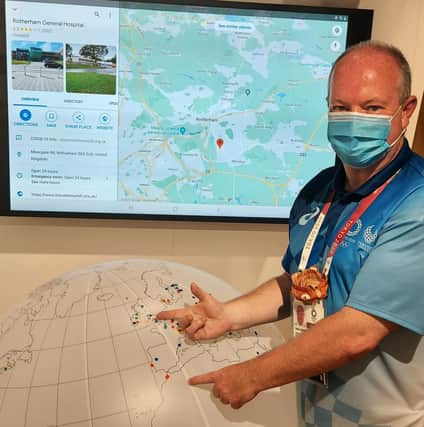My Paralympic summer: hospital physio reflects on Tokyo trip as drug tester


Brian Gilmore took the long trip to Japan to work as a doping control officer, but found the chance to see runner Laura Muir in finals action and fit in a bit of zebra spotting, too.
Brian, who works as a member of The Rotherham NHS Foundation Trust’s community hospital admission avoidance service (CHAT), had already worked at other major international sporting events, including the Commonwealth Games, Euro 96, Rugby World Cups and London 2012.
Advertisement
Hide AdAdvertisement
Hide AdBut the 52-year-old described his work in Tokyo as a real high point, adding: “Not even the daily PCR tests, 14 days quarantine and eLearning put me off.”
During the 17-day Olympic competition, Brian was allocated to rowing, kayaking, canoeing and triathlon events — and worked alongside fellow experts from Japan, Brazil, Hungary, Thailand and Fiji.
The doping control officers were tasked with collecting urine and blood samples from competitors to submit to the International Olympic Committee (IOC) laboratory for analysis, often at no notice to the athlete.
“Working at the finish line and being able to see how hard the athletes compete for medals was exhilarating,” Brian said.
Advertisement
Hide AdAdvertisement
Hide Ad“Chaperoning them through their cooling down period, their media commitments and even their medal ceremony was a unique experience, before escorting them into anti-doping to provide their sample.”
But it wasn’t all fun and games — Brian added that some days, he would be required to wake athletes up from 6am, giving the Olympians the chance to provide samples which could see them cleared to compete or forced to quit.
Describing his highlight moment from the Olympics, Brian said: “My favourite part of my time working in Toyko was on every finals day — helping medal winners through our processes and working closely with the presentation and media teams to do this with as minimal disruption to the athlete as possible.
“But I also got to enjoy a day off visiting the Shibuya Crossing, where multiple zebra crossings combine to allow hundreds of pedestrians to race across the road in synch.”
Advertisement
Hide AdAdvertisement
Hide AdAnother unforgettable moment for Brian in Toyko was getting to see Team GB athlete Laura Muir win her 1,500m silver medal.
He added: “I felt so privileged to have been there, when many families and friends could not attend.
“I like to think that my support was loud enough to make some small contribution.
“Now I am back at work, it is great to chat with colleagues and hear what they thought of the games.
Advertisement
Hide AdAdvertisement
Hide Ad“We shared an experience of sport, but viewed from very different
perspectives.”
Brian explained that he had first worked in Anti-Doping at The World Student Games in Sheffield in 1991 and have continued in his role ever since.
“Having worked at other major events, I was eligible to apply to work at Tokyo 2020, and was selected when I successfully completed online and practical training sessions which dealt with all possible scenarios that could be encountered at the games,” he said.
“The two roles don't overlap – I am a physiotherapist by day, Doping Control Officer at nights or weekends.
Advertisement
Hide AdAdvertisement
Hide Ad“I enjoy both roles, and the doping job occasionally gives me the chance to travel beyond South Yorkshire.
“Both jobs demand an ability to work with a variety of people from a varied backgrounds, sometimes in a stressful situation and often within a team.”